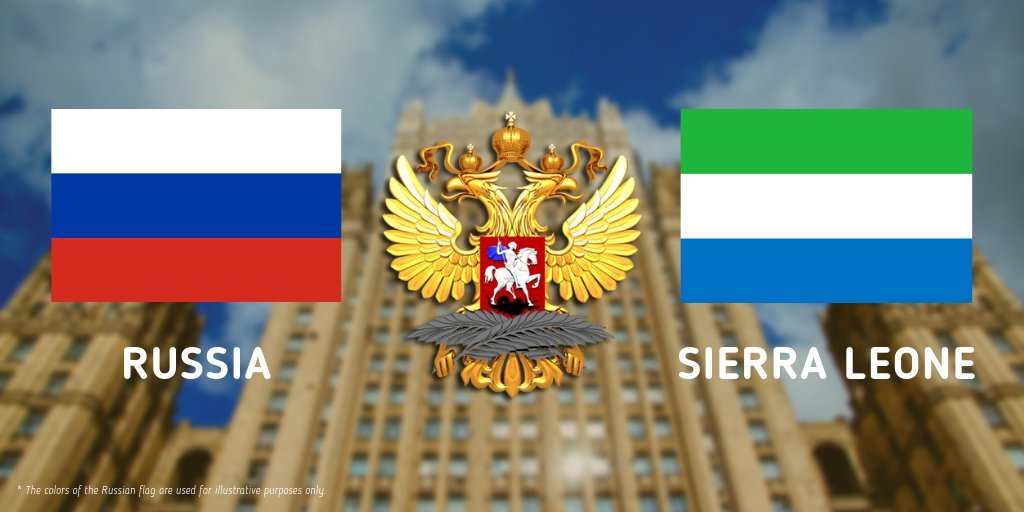|
Listen to article
Getting your Trinity Audio player ready...
|

Despite the Western sanctions on Moscow and its military struggle in the neighbourhood, Russian footprints in the African region have expanded over the past few years. Be it by providing military trainers and weapons in the continent through the Wagner group or on the other hand, providing scholarships to African students to study in Russia, Moscow is clearly not scaling back its ambitions in the Global South. Against this backdrop, this article explores the growing ties between Sierra Leone, a Western African country, and Russia. From diplomatic efforts to economic ventures, the article analyses the motivations behind this partnership and its significance for addressing challenges and opportunities for Sierra Leone.
Located on the Gulf of Guinea, Sierra Leone, a rich-resource country, has been in the spotlight for many reasons over the past few decades. Its long-lasting civil war in the 1990s and a severe outbreak of Ebola in 2014-16 caused thousands of deaths, and, in recent years, the re-election of President Bio have raised questions about the voting system and vote count in the country. These domestic challenges have attracted international attention to Freetown’s socio-political scenario and to the growing economic disparities in the country. However, Sierra Leone has been more in the news since 2021 because of its strengthening ties with Russia. In 2021, Sierra Leone’s Minister of Foreign Affairs and International Cooperation, Prof. David J. Francis, during his visit to Moscow, signed a Memorandum of Understanding for a ‘Visa-free Movement’ of holders of both Diplomatic and Service passports with his counterpart, Sergei Lavrov, the Minister of Foreign Affairs of the Russian Federation to facilitate the movement of people between the two countries.
During the same visit, both countries discussed boosting diplomatic interactions. Moscow reiterated its commitment to increase the number of scholarships that it grants to Sierra Leonian students every year. Historically, right after Sierra Leone’s independence in 1961, both countries established diplomatic ties. Russia has been providing humanitarian assistance to the country as well as scholarships to over three thousand Sierra Leonean students. While Sierra Leone’s economy remains heavily dependent on mineral exports from its significant deposits of iron ore, rutile, bauxite, and diamonds, more recently when Russian Foreign Minister Sergey Lavrov recently hosted his counterpart from Sierra Leone, Timothy Kabba, in Moscow for discussions aimed at enhancing bilateral ties in May 2024, they explored a new dimension of cooperation, Moscow and Freetown announced the construction of a nuclear power plant in Sierra Leone.
“It is planned to open new diplomatic missions in Africa, including in Freetown. We plan to do this in Freetown this year. All relevant decisions have been made,” said Minister Lavrov during the discussion. “We need to implement them. This is a practical task, and we are addressing it.” It is pertinent to mention that for Moscow, this collaboration has twofold benefits: one, economic and two, geopolitical. This commercial initiative will ensure long-term revenues for Moscow, which is isolated from the West. Similarly, it will aid in cementing the presence of Russia in an Atlantic Ocean country. As for Freetown, with increasing volatility in oil prices in recent years and the need to transition to cleaner sources of energy, many African governments have shown an interest in investing in nuclear power. Tapping on this, Russia has been making strides to export its technology and to build nuclear plants in the Global South. It is noteworthy that, as of today, there is only one nuclear plant on the African continent i.e. in South Africa.
As for Sierra Leone, along with several other countries on the continent, hundreds of millions of African people lack electricity. Hence, the countries in Africa want to provide affordable electricity to their people. It is interesting to mention that a policy briefing published by the South African Institute of International Affairs (SAIIA) states, “The need to look at nuclear energy as a major component of Africa’s future energy mix is imperative, as it does not emit greenhouse gases during operation”, advocating for a nuclear power generation in the continent. Therefore, for them, it’s an opportunity to invoke positive change. Apart from Sierra Leone, Russia’s state nuclear corporation ‘ROSATOM’ has already signed peaceful nuclear cooperation agreements with Burkina Faso, Mali and Algeria. Kenya, Uganda and Rwanda have also announced plans to construct nuclear power plants.
In addition to the above discussion, they also paid attention to a broad range of issues related to sustainable development against the backdrop of the Russia-Africa Summit held in July 2023 in St. Petersburg. Apart from nuclear cooperation, the bilateral relations also include projects in the area of subsoil exploitation. In this context, a memorandum of cooperation was signed between the two countries earlier this year, in January 2024 for conducting geological and geophysical research, assessing deposits, and drawing up geological maps.
Nonetheless, despite the increasing efforts of Moscow to improve its presence in the continent, one can’t overestimate Russia’s influence in the region. Compared to the US, the EU, China, and India, Russia has little bilateral trade and less political and cultural clout. However, while French troops pulled out of Burkina Faso and Mali, 1,600 former Wagner soldiers, now integrated with regular Russian Forces, are currently stationed in Mali and neighbouring countries are also hosting Russian contingents. The West’s failure to stabilise and strengthen African institutions and unwarranted sanctions have left no choice for African governments but to explore cooperation with other partners. Therefore, the West’s eclipse from Africa allows Moscow to advance its influence and fortify its presence in the region.






Add comment